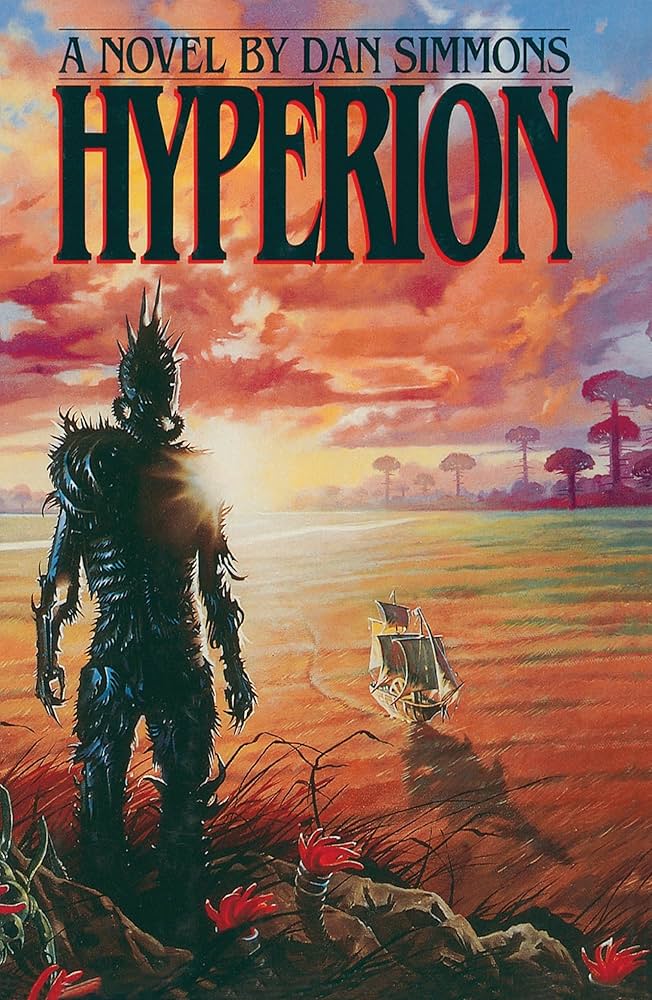I just finished the audiobook of Hyperion, by Dan Simmons. The TL:DR; is I would give it a 7/10 and would recommend to anyone who enjoys science fiction. There are no spoilers in this review.
Hyperion is "old science fiction" by my standards not because it was published in 1989, but because you can specifically tell it was written in the late 80's by what the author thinks to mention and what they don't. This isn't a real classification, it's my own personal one. I find it quaint when authors from the 70's and 80's go out of their way to call wrist watches "chronometers", and emphasize that physical dead-trees paper is antiquated. It feels like this was supposed to give weight to the technology of the setting; in the 70's and 80's, miniaturization of computers and a move from paper to digital media was a topical thing. Calculator watches and talking clocks especially were somewhat of a novelty. Audiences would likely read casual references to a wrist-worn computer and think, "Ooh, fancy."
A Scanner Darkly frequently mentions magnetic tapes, a technology which has been mostly obsoleted in 2025, in what is supposed to be a futuristic setting. Snow Crash has several references to optical media and disks. Eureka pointedly shows characters using mobile phones about the size of a GoPro, which was probably way cool in 2006. Today, one might watch it and think, "How is anyone supposed to text on that?" Trick question, texting was not a mainstream thing yet, the writers simply didn't consider the possibility that in the future people might not use phones to actually call people.
I guess this could be annoying (or at least underwhelming) to some, but I find it charming. And Hyperion is full of plenty of other hard science fiction gizmos. Faster-than-light travel, laser guns, AIs, and medicine with nearly magical effects all make an appearance.
What really makes this "early" science fiction special to me, and what Hyperion does especially well, is to make the techno-jargon almost completely irrelevant. Star Wars occurs in space with futuristic technology and robots and the works, but the weight of the story has almost literally nothing to do with the characters. You could re-tell the story in a medieval setting, with the estranged knight Sir Lucas Skywalker battling his father, the evil king Lord Vader, and it would probably work just fine. Imagine that same basic feeling, with more mature themes and an even stronger focus on the emotional bonds between characters, and you get something like Hyperion.
The story arc is almost entirely focused around seven strangers being placed in an uneasy alliance, visiting their stories one by one as they get to know each other. Technology is rarely used in Hyperion to drive tension and plot movement, but characters are. I found the book a little mundane for the first sections, and then started to get really into it as the personalities of the characters were rolled out. Dan Simmons does a great job at making the seven pilgrims on their journey feel like real people (with only one notable exception), and the stories they tell are bizarre, inventive, engaging, and emotionally gripping. Not once will you get an extended monologue about how some gizmo or gadget works in the world of Hyperion, the science fiction elements instead form a subtle and natural framework for the real meat of the story - the characters themselves - to be realized within.
Another thing that strikes me about "old" science fiction is the inclusion of religious themes. I read A Canticle for Leibowitz and thought the "Catholics in space" archetype was a niche thing, but they're present in other stories, including Hyperion. I think the more we collapse into total secularism, there's often something missing about how science fiction engages with deep existential questions. Hyperion is by no means a religious book - there are both positive and negative portrayals of religion, and in some parts anti-religious messages - I just think it's more interesting when it is factored in at all, especially in a way that feels both authentic and nuanced.
In some sense, Hyperion's greatest strength is also a weakness. There are lots of stories about characters connecting to each other. In fact, one could probably argue that an emotional connection between the characters and the audience is a requirement for a good story. This means while Hyperion is extremely well-written and fun to read, it doesn't really offer anything wildly unique. I don't really consider this a slight against the book, though.
In conclusion, if you want techno-porn in any sense of the word, you probably shouldn't read Hyperion. If you're looking for an interesting character study, I would strongly recommend.

